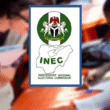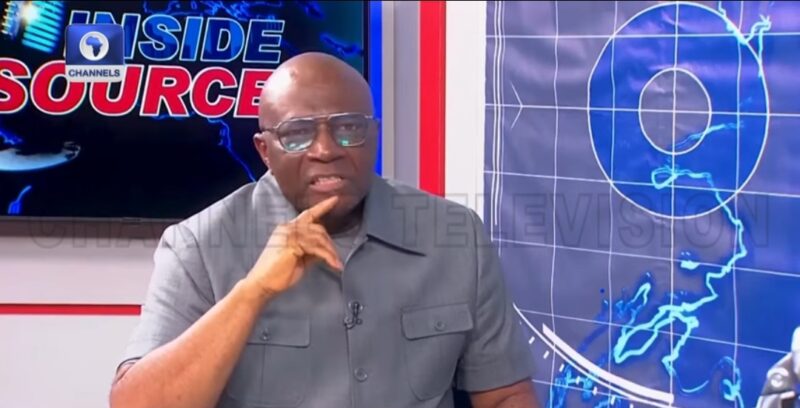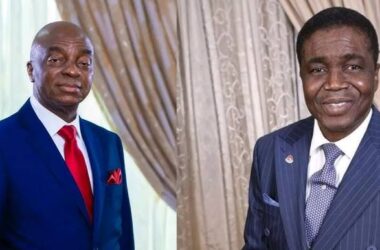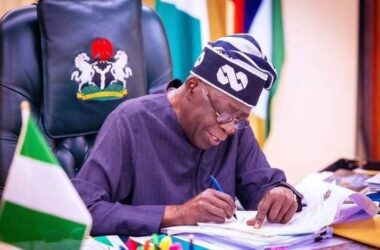*Onanuga agrees Tinubu needs an enforcer in the Villa
There is the need for governors to prioritize developmental initiatives and move beyond a narrow dependency on the federal government for progress in their states. This was the view of Mr. Bayo Onanuga, Special Adviser to President Bola Tinubu on Information and Strategy, on his appearance on Inside Sources with Laolu Akande on Channels TV on Sunday.
Onanuga conveyed the presidency’s growing dissatisfaction with state governors’ perceived lack of developmental initiatives.
The veteran journalist said, “In this country, maybe because we’ve had so many years of Military rule, our attention seems only focused on the Federal Government. We cannot continue on the level at all with such mindset. If you look at the revenues that the tiers of government share, the federal government don’t take up to 52%. If we really want to take a big leap in our country, the sub-nationals must really wake up.
“Can you imagine, in this country, only Lagos state has Urban transport system. Only a few weeks ago, Abia state opened its first bus stop construction. The states should reset their priorities,” he added.
“It was not for a joke that President Tinubu campaigned on the Renewed Hope agenda,” Onanuga emphasized. “The goal is clear—to drive Nigeria’s economy towards a diversified trillion-dollar GDP.” According to Onanuga, recent data from Nigeria’s economic performance underpins the government’s vision; surpluses recorded in the first two quarters of the year are not from oil, which has traditionally dominated Nigeria’s economy, but from diverse non-oil sectors.
A critical part of this transition is the focus on Compressed Natural Gas (CNG) as an energy alternative. President Tinubu has urged a shift toward CNG, reflecting global trends moving away from fossil fuels. Onanuga revealed, “We aim to see one million vehicles converted to CNG in the coming months as part of the presidential CNG initiative. This administration is making strides towards managing the country’s energy transition.”
Onanuga also defended the administration against accusations of insensitivity, particularly concerning the purchase of a refurbished presidential jet and the size of official delegations. He clarified that the new jet was procured with safety concerns in mind, not luxury. “The plane previously used was over 20 years old and increasingly costly to maintain. Safety was paramount when the National Assembly approved a new aircraft,” he explained.
Regarding high-profile appointments, Onanuga noted constitutional requirements, such as each state having a minister, which inevitably led to an expanded cabinet. “Certain ministries are critical to the president’s agenda and require additional oversight,” he said. He also addressed criticism from notable figures like Asari Dokubo about the reformation of the Niger Delta Ministry, clarifying that the ministry has been expanded into the Ministry of Regional Development to encompass emerging regional commissions beyond the Niger Delta.
Onanuga also defended the performance of the Independent National Electoral Commission (INEC), stressing that the federal government respects its independence. However, he expressed concern that some state governors are undermining local council elections, preventing the growth of grassroots democracy.
A discussion with host Laolu Akande centered on the need for an enforcer in the Villa—someone to ensure policy execution aligns with presidential directives. Onanuga agreed, sharing a recent instance when he informed President Tinubu about delays in approved payments to ASUU. “The President was upset to learn of the delay and promptly addressed it. We need individuals who will ensure things are done without delay,” he added.
Onanuga’s message underscored the administration’s urgency in economic transformation, demanding active collaboration from state governors and state institutions. The presidency’s vision, he concluded, is not just about high-level policies but also depends on local leaders actively working to improve their constituents’ lives. “The states need to reset their priorities, focus on critical sectors like education, and step up their responsibilities,” he said.










